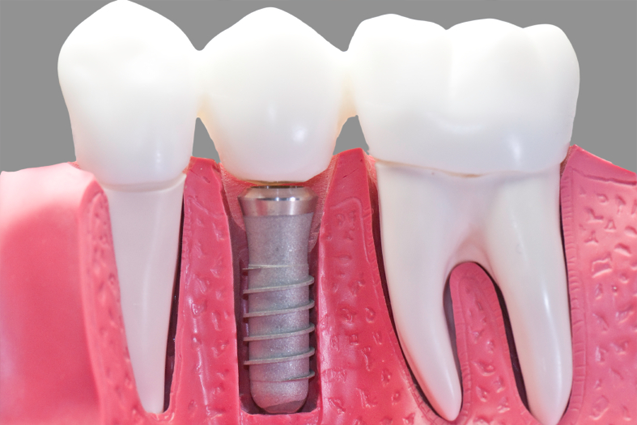Dental Implants
A dental implant is an artificial tooth ‘root’ (often made of medical-grade titanium) that is placed into the jaw bone to support an artificial tooth (usually a porcelain crown). Titanium is a biocompatible material and is virtually allergy-free. The implant is usually inserted into the jaw bone under a local anaesthetic and the bone grows onto the implant and integrates to the surface.
A dental implant looks, feels and functions like a natural tooth. Implants can be a very good long term option (they can often last longer that a dental bridge, but this is very much dependent on the implant owners level of ongoing oral hygiene).
When can dental implants be used?
Dental implants are used in three different ways:
- To replace a single missing tooth
- To support a bridge (when several teeth are missing)
- To support and retain a denture (implant-retained dentures) in instances where a majority or all teeth are missing
How does it work?
Will I be a suitable candidate?
An implant can only be placed if there is enough bone under the gum to support it. If you have lost teeth due to gum disease (periodontitis), you may find that you are not a suitable candidate. This is one of the reasons why an x-ray needs to be taken at your examination appointment. Smoking increases the chances of gum disease and considerably delays healing of the implant site, increasing the procedure time and in some cases, causes the implant to fail altogether. If you are a smoker and you want to seriously consider dental implants, we would strongly recommend that you stop smoking. Talk to your Dentist about this.
How do I look after Implants?
Implants need to be cared for much the same as natural teeth. Like natural teeth, they can get infections around the gum. If left untreated, this infection can spread to the bone that has integrated into the titanium ‘root’ which, in turn, can lead to the loss of the implant. To prevent this from happening, brush thoroughly with a soft toothbrush, floss or use interdental brushes daily around the implant (as well as all the rest of your teeth) and develop a regular maintenance routine with our Oral Health Therapist.
Click here to contact us today for more information or to make an appointment.

